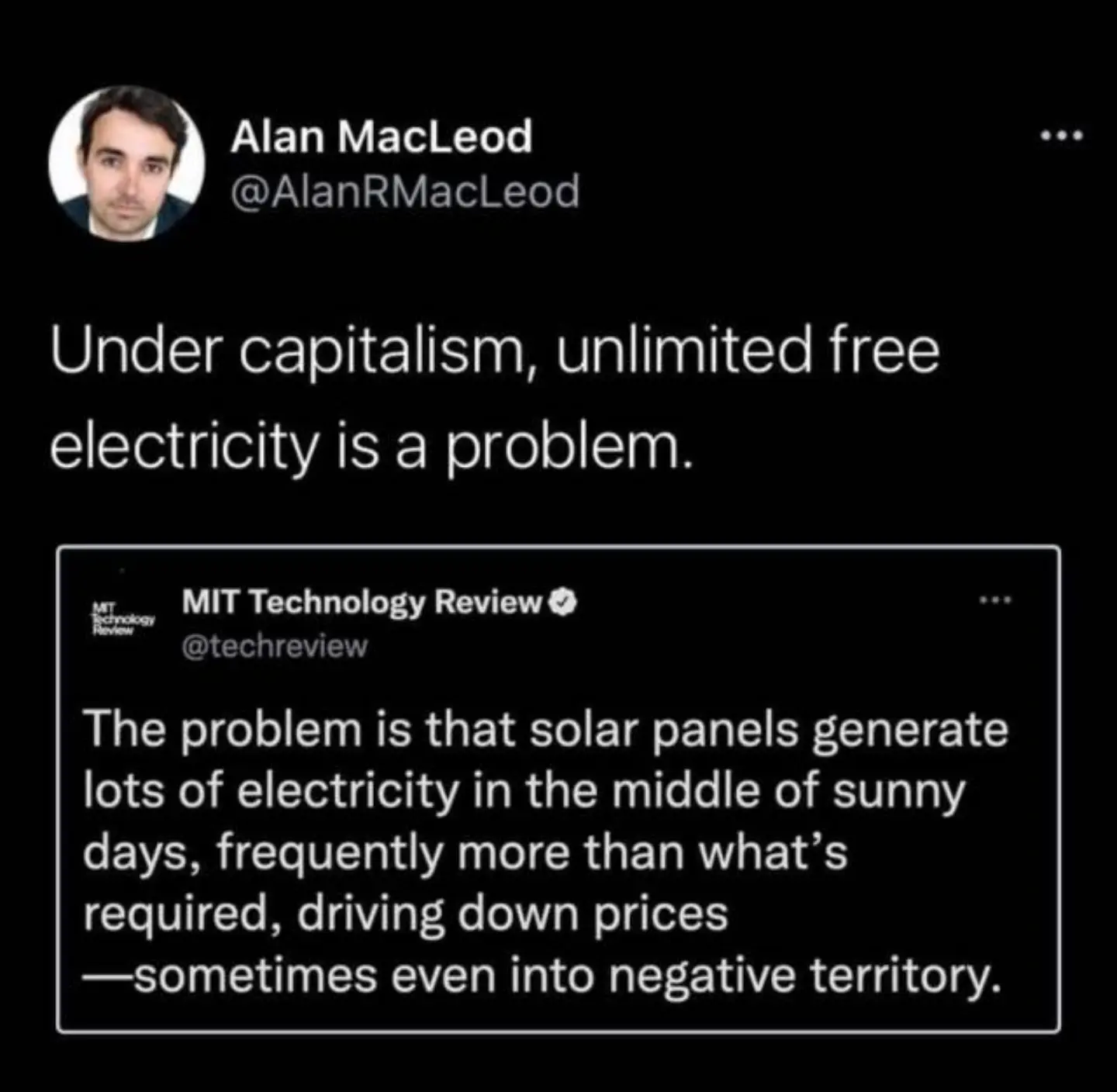this post was submitted on 09 Apr 2024
1657 points (96.0% liked)
Solarpunk
5653 readers
76 users here now
The space to discuss Solarpunk itself and Solarpunk related stuff that doesn't fit elsewhere.
Join our chat: Movim or XMPP client.
founded 2 years ago
MODERATORS
you are viewing a single comment's thread
view the rest of the comments
view the rest of the comments

Actually there is a good amount of credible economic theory which backs the idea that localized post-scarcity markets do cause capitalist influences to wither away, and that power generation is a big fucking domino in that equation. The simple version is that maintenance of artificial scarcity is modeled as capital overhead, so there will always be an inflection point where that overhead actually exceeds the value of all other inputs. The same way eg, marketing cannot create infinite or arbitrary demand.
The other angle here is how there is often incentive for alternative commodification of abundance, which in turn incentives that abundance. This is another common model for various forms of post-scarcity capitalism. Take a YouTube video for example. The commodification of content takes the form of advertising, which effectively transfers the scarcity of one market onto another. Content is basically infinite compared to viewership time inputs. The key here is that there will always exist some forms of scarcity - and time is the big one. Art, company, leisure, physical space, etc. the model here is that eventually something like energy and physical resources might be completely abundant and effectively free, but enabled by competition over attention or leisure or aesthetic experience. You can make a strong argument that this is already happening in the post-industrial world to some degree.
The final issue is that this equation isn't unique to capitalism. Socialism mediates scarcity in more or less the same way - by transferring and meditating it across various markets using labor as the quanta of scarcity instead of capital. Indeed, many economists will argue that regulated, democratic, liberal forms of capitalism theoretically reduces to the same core basis, since "free [as in speech] labor" itself both creates the market regulation as well as provides the consumption which mediates access to capital. This is, in fact, the core thesis of "third way" market socialism, though it is obviously contentious among orthodox Marxists.
I think the best nation-states, in terms of happiness index, practice "third-way" market socialism or as close of an approximation as they can to it in all but name. I would even include the United States during the post-WW2 economic expansion.
The nordic countries, which tend to score higher on "Happiness Indexes," are Social Democracies. Social Democracy is a form of revisionist Marxism that believes Capitalism can be wielded for the benefit of all, not just the bourgeoisie.
Unfortunately, these same Nordic countries have been seeing a sliding of the Social Safety Net, similar to what has happened to America following the New Deal (though not nearly as bad yet). Additionally, Imperialism is still the dominant method by which these countries subsidize their safety nets, alongside a dependence on NATO.
Time for humanity, united, to expand its imperialism towards the stars! That way, filthy xenos subsidize everything instead of our own brethren
21st century Nordic imperialism and 'dependence' on a defensive alliance that has only ever been invoked once. Top shelf brainrot.
Yes, economic imperialism based on unequal exchange and dependence on a larger military coalition as a safeguard.
US post-WW2 was almost a functioning social democracy, but not market socialism. Market socialism would be something more along the lines of the Labour-dominated era of Israel, or Socialist Yugoslavia.
Yup. The US model is occasionally referred to as "pension fund socialism" (sometimes sarcastically) in the sense that there is a welfare system which resembles a social dividend for the less fortunate, social security which resembles a social dividend for the elderly, and privileged IRA accounts, which resembles collective ownership of capital for the working class. The collective value of US IRA accounts is actually something like 20% of nominal GDP, and social security is like another 10% of GDP. Depending on how you measure it, this makes the actual collective share of the US economy proportionally larger than it was under the USSR or modern day China.
The big thing the US is missing is a healthcare dividend. Also, the welfare layer is arguably much too small, which creates much worse wealth disparity than need be. Still, this is arguably an issue of buttons and knobs rather than the structural issue many make it out to be.